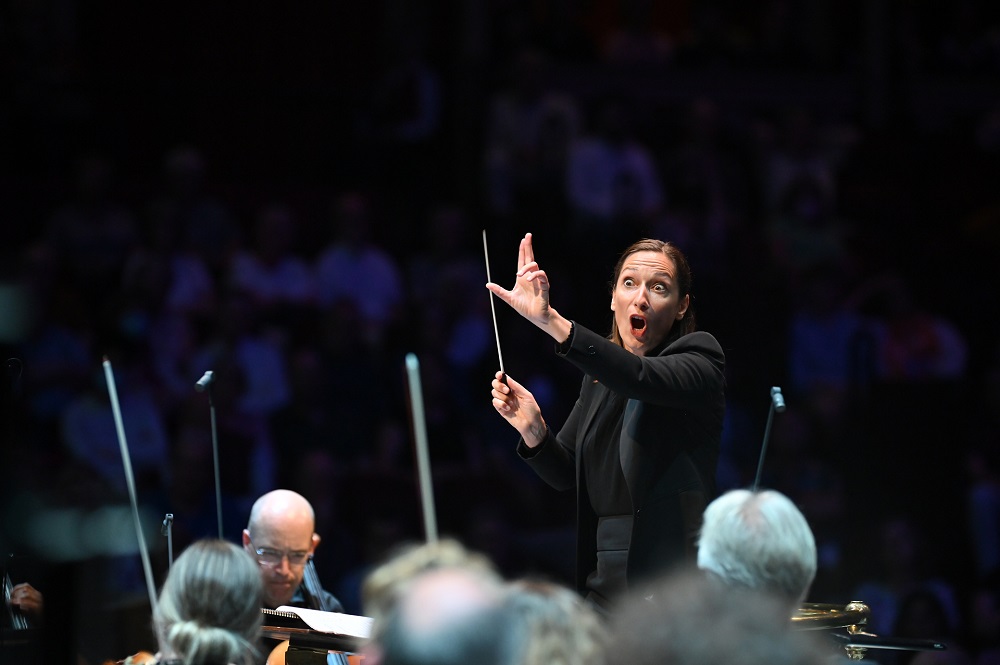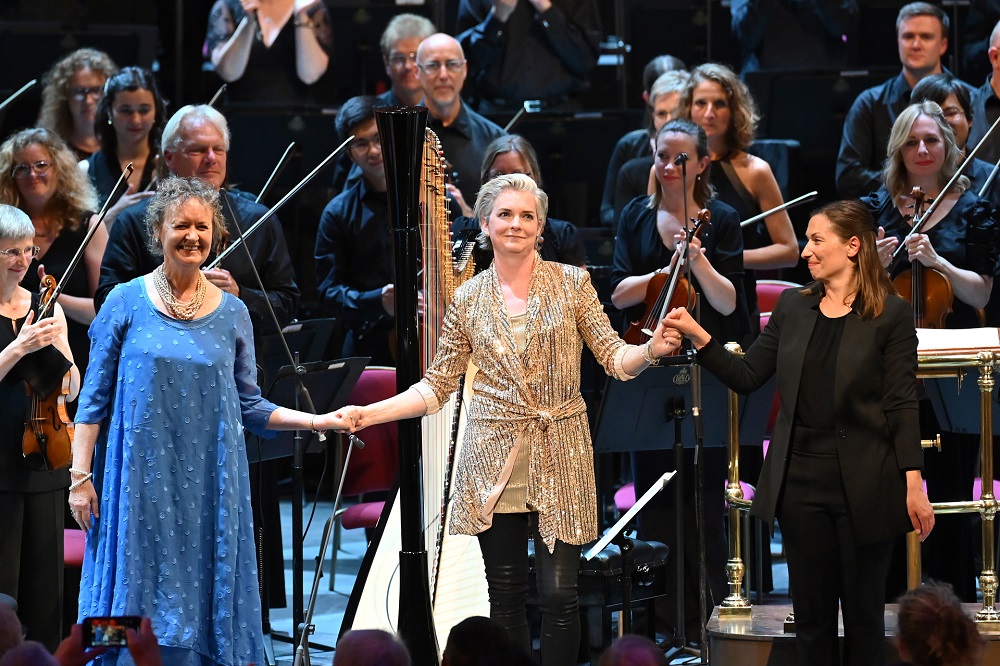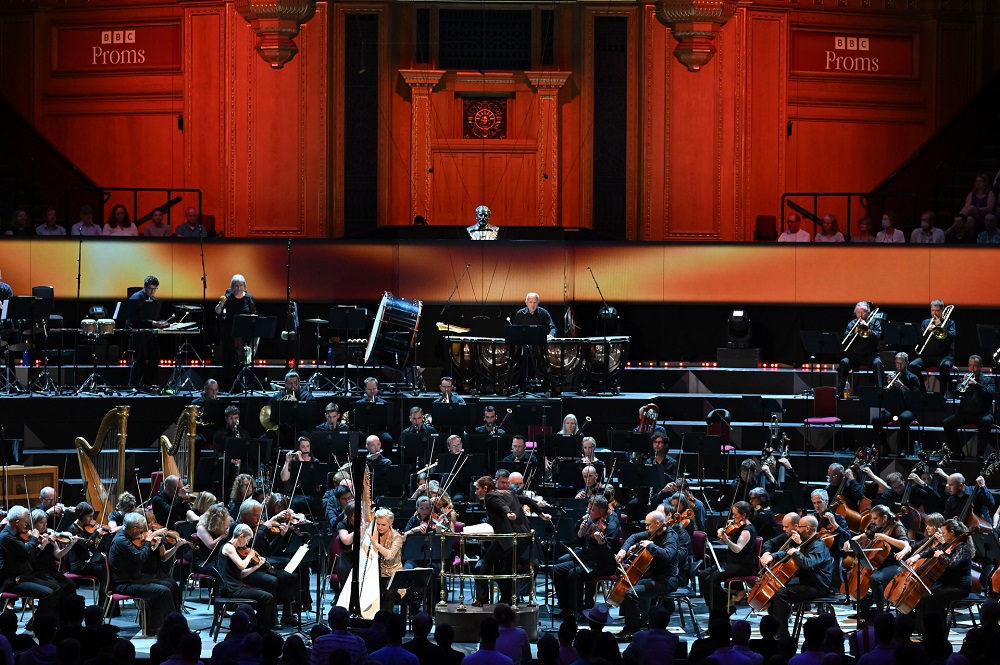Prom 9, Finch, BBC National Orchestra of Wales, Matiakh review - thrilling, conceptually fascinating evening | reviews, news & interviews
Prom 9, Finch, BBC National Orchestra of Wales, Matiakh review - thrilling, conceptually fascinating evening
Prom 9, Finch, BBC National Orchestra of Wales, Matiakh review - thrilling, conceptually fascinating evening
Two S(c)heherazades frame a beehive of activity by Sally Beamish
The spirit of Sir Richard Burton loomed large over the Royal Albert Hall last night – a man who wrote about everything from falconry to erotica and whose death-defying expeditions took him across the Middle East, Africa and the Americas.
Rimsky-Korsakov was arguably the first composer to produce a definitive response to this controversial text and his Scheherazade (1888) formed the second part of this musically and conceptually fascinating evening. The Prom’s first Shéhérazade (minus the “c”), was a subtly different exploration of orientalism composed in 1898 by the then little-known Ravel. In between them, Hive – a world premiere by Sally Beamish – tipped its hat to the Russian composer, going beyond the flight of the bumble bee to show how insect and human power games can be equally brutal.
All three works were performed by the BBC National Orchestra of Wales, conducted with meticulous élan by the French conductor Ariane Matiakh (pictured below) in her Proms debut. Throughout, Matiakh – the recently appointed chief conductor of the Würrtemberg Philharmonic in Reutlingen – deployed her conductor’s baton with the precision of a scalpel, filleting sound from the orchestra in a way that thrillingly revealed the anatomy of each composer’s intentions. 
Ravel himself would reject the overture, going on to produce a second, more successful Shéhérazade – this time a song cycle – in 1904. However, in this deft account of his 1898 work by the BBC National Orchestra of Wales there was no sense of clumsiness; indeed in the formal experimentation it was possible to hear a foreshadow of later, more successful works, like Jeux d'eaux.
It opened with an oboe solo – chosen by Ravel presumably because the instrument’s descended from the Middle Eastern shawm. Lead oboe player David Hudson delivered the notes plangently before the theme was picked up by flutes who added a serpentine flourish. As the rest of the orchestra came in, led by the violins, there was a sense of sound shimmering like mirages in the desert. With the brass it built to a feverish intensity before moving into the second more lyrical section.
As the piece shifted from swooning lyricism to defiant agitato, from ripples of the harp to thunderous brass, the muscular discipline of the orchestra brought a constant sense of aerodynamic precision. Towards the end Ravel’s musical ideas started to feel a little too repetitive, yet while the performance didn’t reinstate the work as a classic, it certainly felt as enjoyably definitive an account as you could get. 
The sense in the opening season, Winter, was at first of vibration rather than defined sound. The harp was muted, the flutes sounded hollowly and the cellos rasped in a dynamic composition of textures where you could almost see the bees’ legs moving and the wings agitating.
Rather like molecules, as the temperature heated up, the notes vibrated and moved around more, and with Spring the composition took flight. In Summer the Queens engaged in a fight to the death, accompanied by crescendoing trumpets and percussion that included Finch rapping on the frame of the harp with her knuckles. Finch (who made her Proms debut aged 11) was dressed vibrantly in a gold sequinned jacket, skinny black trousers and red pointed boots. Her electric, compelling performance ended with Autumn as the bees returned to the hive for winter.
After the interval, the orchestra deployed its full muscle to push us out onto the sea with Sinbad and experience why Rimsky-Korsakov’s work proved such an inspiration to other composers of the time. After the sinister descending whole tone scale – generally interpreted as an introduction of the murderous Sultan – and the soaring violin solo that evoked Scheherazade, the orchestra swung into the dynamic arpeggiated section that depicted the ebb and sway of the sea. 
Our voyage through the different landscapes takes us to a fourth movement in which, with its pumping brass and agitated strings, we have a full sense of Baghdad at the full height of its Silk Road splendour. It’s a wonderful resonant climax to the evening. No surprise that Ravel and others would be inspired to push their own boundaries by Rimsky-Korsakov's example. Though you suspect he would have despaired if he had realised the degree to which Europe and Russia's romantic fascination with the Middle East would carry sinister political consequences as the Ottoman Empire collapsed and Europeans started to ponder their own new world order.
rating
Explore topics
Share this article
The future of Arts Journalism
You can stop theartsdesk.com closing!
We urgently need financing to survive. Our fundraising drive has thus far raised £49,000 but we need to reach £100,000 or we will be forced to close. Please contribute here: https://gofund.me/c3f6033d
And if you can forward this information to anyone who might assist, we’d be grateful.

Subscribe to theartsdesk.com
Thank you for continuing to read our work on theartsdesk.com. For unlimited access to every article in its entirety, including our archive of more than 15,000 pieces, we're asking for £5 per month or £40 per year. We feel it's a very good deal, and hope you do too.
To take a subscription now simply click here.
And if you're looking for that extra gift for a friend or family member, why not treat them to a theartsdesk.com gift subscription?
more Classical music
 Hallé John Adams festival, Bridgewater Hall / RNCM, Manchester review - standing ovations for today's music
From 1980 to 2025 with the West Coast’s pied piper and his eager following
Hallé John Adams festival, Bridgewater Hall / RNCM, Manchester review - standing ovations for today's music
From 1980 to 2025 with the West Coast’s pied piper and his eager following
 Kaploukhii, Greenwich Chamber Orchestra, Cutts, St James's Piccadilly review - promising young pianist
A robust and assertive Beethoven concerto suggests a player to follow
Kaploukhii, Greenwich Chamber Orchestra, Cutts, St James's Piccadilly review - promising young pianist
A robust and assertive Beethoven concerto suggests a player to follow
 Robin Holloway: Music's Odyssey review - lessons in composition
Broad and idiosyncratic survey of classical music is insightful but slightly indigestible
Robin Holloway: Music's Odyssey review - lessons in composition
Broad and idiosyncratic survey of classical music is insightful but slightly indigestible
 Classical CDs: Wolf-pelts, clowns and social realism
British ballet scores, 19th century cello works and contemporary piano etudes
Classical CDs: Wolf-pelts, clowns and social realism
British ballet scores, 19th century cello works and contemporary piano etudes
 Bizet in 150th anniversary year: rich and rare French offerings from Palazzetto Bru Zane
Specialists in French romantic music unveil a treasure trove both live and on disc
Bizet in 150th anniversary year: rich and rare French offerings from Palazzetto Bru Zane
Specialists in French romantic music unveil a treasure trove both live and on disc
 Scottish Chamber Orchestra, Ibragimova, Queen’s Hall, Edinburgh review - rarities, novelties and drumrolls
A pity the SCO didn't pick a better showcase for a shining guest artist
Scottish Chamber Orchestra, Ibragimova, Queen’s Hall, Edinburgh review - rarities, novelties and drumrolls
A pity the SCO didn't pick a better showcase for a shining guest artist
 Kilsby, Parkes, Sinfonia of London, Wilson, Barbican review - string things zing and sing in expert hands
British masterpieces for strings plus other-worldly tenor and horn - and a muscular rarity
Kilsby, Parkes, Sinfonia of London, Wilson, Barbican review - string things zing and sing in expert hands
British masterpieces for strings plus other-worldly tenor and horn - and a muscular rarity
 From Historical to Hip-Hop, Classically Black Music Festival, Kings Place review - a cluster of impressive stars for the future
From quasi-Mozartian elegance to the gritty humour of a kitchen inspection
From Historical to Hip-Hop, Classically Black Music Festival, Kings Place review - a cluster of impressive stars for the future
From quasi-Mozartian elegance to the gritty humour of a kitchen inspection
 Shibe, LSO, Adès, Barbican review - gaudy and glorious new music alongside serene Sibelius
Adès’s passion makes persuasive case for the music he loves, both new and old
Shibe, LSO, Adès, Barbican review - gaudy and glorious new music alongside serene Sibelius
Adès’s passion makes persuasive case for the music he loves, both new and old
 Anja Mittermüller, Richard Fu, Wigmore Hall review - a glorious hall debut
The Austrian mezzo shines - at the age of 22
Anja Mittermüller, Richard Fu, Wigmore Hall review - a glorious hall debut
The Austrian mezzo shines - at the age of 22
 First Person: clarinettist Oliver Pashley on the new horizons of The Hermes Experiment's latest album
Compositions by members of this unusual quartet feature for the first time
First Person: clarinettist Oliver Pashley on the new horizons of The Hermes Experiment's latest album
Compositions by members of this unusual quartet feature for the first time

Add comment